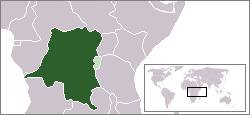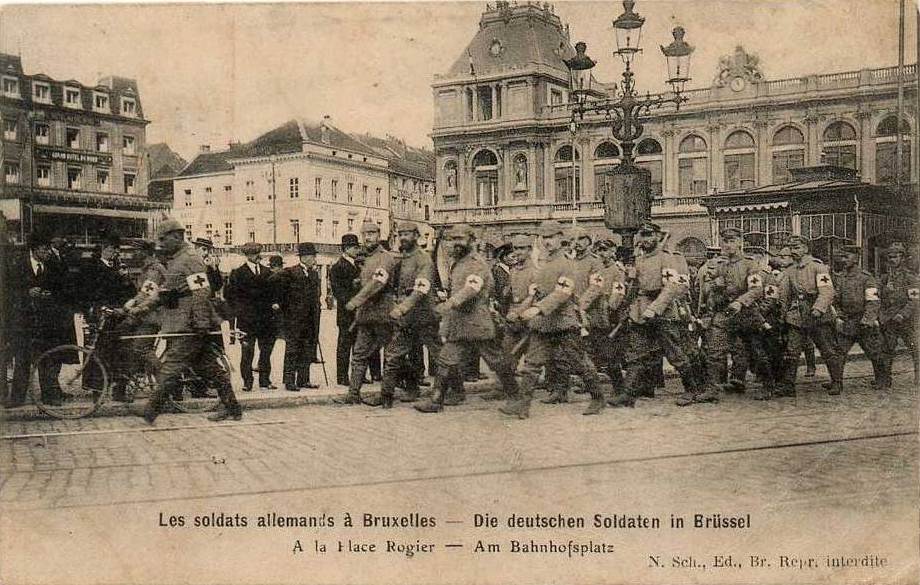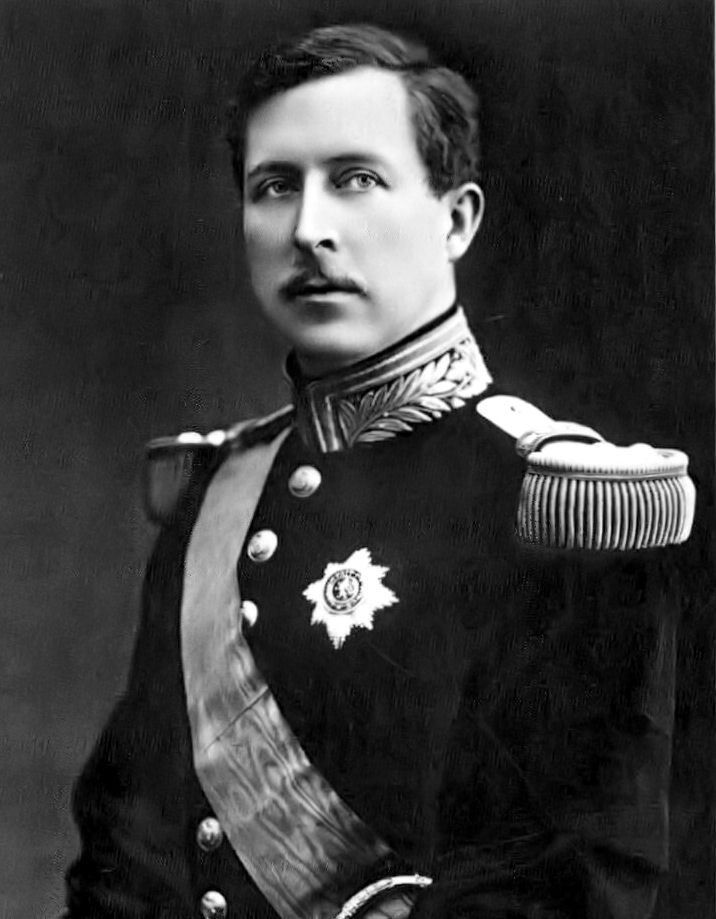|
Félix Fuchs
Félix Alexandre Fuchs (1858–1928) was a Belgian colonial civil servant and lawyer who served as Governor-General of the Belgian Congo between 1912 and 1915. A lawyer by profession, Fuchs joined the administration of the Congo Free State in 1888 as a jurist and quickly rose through the ranks. Considered a Liberal, Fuchs's civilian background and attitudes distinguished him from the majority of colonial administrators who had begun their careers in the military. Rising to the highest ranks of the administration in the late 1890s, Fuchs eventually became Governor-General after the Congo's annexation by Belgium and presided over the Congo's entry into World War I. Career Fuchs was born into a family of Prussian origin in Ixelles, Brussels in Belgium on 25 January 1858. He was naturalised as a Belgian citizen in 1862 and, in 1876, went to study Law at the Free University of Brussels. He later practiced as a lawyer at the court of appeal in Brussels. In 1887, Fuchs began workin ... [...More Info...] [...Related Items...] OR: [Wikipedia] [Google] [Baidu] |
List Of Colonial Governors Of The Congo Free State And Belgian Congo
This is a list of European colonial administrators responsible for the territory of the Congo Free State and Belgian Congo (today the Democratic Republic of the Congo). International Association of the Congo Prior to the creation of the Congo Free State, the International Association of the Congo (IAC) had signed treaties with over 300 native Congolese chiefs and in effect exercised sovereignty over a large area of the Congo Basin. The IAC was headquartered in Belgium and run by a committee under the presidency of Maximilien Strauch. Prior to the creation of the office of Administrator-General, authority on the ground in the Congo had been exercised by a Chief of Expedition, who until April 1884 was Henry Morton Stanley. Congo Free State Administrators-General / Governors-General Vice Governors-General Belgian Congo On 1 July 1960, the Belgian Congo became independent as the Republic of the Congo The Republic of the Congo, also known as Congo-Brazzaville, the C ... [...More Info...] [...Related Items...] OR: [Wikipedia] [Google] [Baidu] |
Foreign Service
Foreign Service may refer to: * Diplomatic service, the body of diplomats and foreign policy officers maintained by the government of a country * United States Foreign Service, the diplomatic service of the United States government **Foreign Service Officer **Foreign Service Institute The Foreign Service Institute (FSI) is the United States federal government's primary training institution for members of the U.S. foreign service community, preparing American diplomats as well as other professionals to advance U.S. foreign ... ** Foreign Service Journal ** Foreign Service brat, term for children born or raised abroad to Foreign Service Officers * Indian Foreign Service, the diplomatic service of India ** Foreign Service Institute of India now the Sushma Swaraj Institute of Foreign Service, under the Ministry of External Affairs in New Delhi, India * Foreign Service of Pakistan, the diplomatic service of Pakistan ** Foreign Service Academy * Her Majesty's Diplomatic Service ... [...More Info...] [...Related Items...] OR: [Wikipedia] [Google] [Baidu] |
Royal Museum For Central Africa
The Royal Museum for Central Africa (RMCA) (; ; ), communicating under the name AfricaMuseum since 2018, is an ethnography and natural history museum situated in Tervuren in Flemish Brabant, Belgium, just outside Brussels. It was originally built to showcase King Leopold II's Congo Free State in the International Exposition of 1897. The museum focuses on the Congo, a former Belgian colony. The sphere of interest, however, especially in biological research, extends to the whole Congo Basin, Central Africa, East Africa, and West Africa, attempting to integrate "Africa" as a whole. Intended originally as a colonial museum, from 1960 onwards it has focused more on ethnography and anthropology. Like most museums, it houses a research department in addition to its public exhibit department. Not all research pertains to Africa (e.g. research on the archaeozoology of Sagalassos, Turkey). Some researchers have strong ties with the Royal Belgian Institute of Natural Sciences. In N ... [...More Info...] [...Related Items...] OR: [Wikipedia] [Google] [Baidu] |
Jules Renkin
Jules Laurent Jean Louis Renkin (3 December 1862 – 15 July 1934) was a Belgian politician who served as Prime Minister from 1931 to 1932. He also served as the minister of colonies for the Belgian Congo from 30 October 1908 to 21 November 1918. Born in Ixelles, Renkin studied and practised law, and helped found the journal ''L'Avenir Sociale''. In 1896 he was elected as a member of the Catholic Party to the Belgian Chamber of Representatives for Brussels, a seat he held until his death. Original on the Christian Democratic wing of the party, Renkin's views became more conservative with time. He held several ministerial posts, Justice in 1907–1908, Colonies from 1908 to 1918, the Interior in 1918–1920, and Railway and Posts from 1918 to 1921. In 1920 he was named an honorary minister of State. In 1931 he became the prime minister of Belgium, also holding the Interior, Finance, and Health portfolios. His government was unable to deal effectively with the econo ... [...More Info...] [...Related Items...] OR: [Wikipedia] [Google] [Baidu] |
German East Africa
German East Africa (GEA; ) was a German colonial empire, German colony in the African Great Lakes region, which included present-day Burundi, Rwanda, the Tanzania mainland, and the Kionga Triangle, a small region later incorporated into Portuguese Mozambique, Mozambique. GEA's area was , which was nearly three times the area of present-day Germany and almost double the area of metropolitan Germany at the time. The colony was organised when the German military was asked in the late 1880s to put down a revolt against the activities of the German East Africa Company. It ended with German Empire, Imperial Germany's defeat in World War I. Ultimately the territory was divided amongst Britain, Belgium and Portugal, and was reorganised as a League of Nations mandate, mandate of the League of Nations. History Like other colonial powers, the Germans expanded their empire in the Africa Great Lakes region, ostensibly to explore the region's rich resources and its people. Unlike other imp ... [...More Info...] [...Related Items...] OR: [Wikipedia] [Google] [Baidu] |
Lake Tanganyika
Lake Tanganyika ( ; ) is an African Great Lakes, African Great Lake. It is the world's List of lakes by volume, second-largest freshwater lake by volume and the List of lakes by depth, second deepest, in both cases after Lake Baikal in Siberia. It is the world's longest freshwater lake. The lake is shared among four countries—Tanzania, the Democratic Republic of the Congo (the DRC), Burundi, and Zambia—with Tanzania (46%) and the DRC (40%) possessing the majority of the lake. It drains via the Lukuga River into the Congo River system, which ultimately discharges at Banana, Democratic Republic of the Congo into the Atlantic Ocean. Geography Lake Tanganyika is situated within the Albertine Rift, the western branch of the East African Rift, and is confined by the mountainous walls of the valley. It is the largest rift lake in Africa and the second-largest freshwater lake by volume in the world. It is the deepest lake in Africa and holds the greatest volume of fresh water on the ... [...More Info...] [...Related Items...] OR: [Wikipedia] [Google] [Baidu] |
Congo Act Of 1885
The Berlin Conference of 1884–1885 was a meeting of colonial powers that concluded with the signing of the General Act of Berlin,''The Belgian Congo and the Berlin act'' by Keith, Arthur Berriedale, 1919, p. 52. an agreement regulating and trade in Africa during the period. The conference of fourteen countries was organised by |
Political Neutrality
A neutral country is a state that is neutral towards belligerents in a specific war or holds itself as permanently neutral in all future conflicts (including avoiding entering into military alliances such as NATO, CSTO or the SCO). As a type of non-combatant status, nationals of neutral countries enjoy protection under the law of war from belligerent actions to a greater extent than other non-combatants such as enemy civilians and prisoners of war. Different countries interpret their neutrality differently: some, such as Costa Rica have demilitarized, while Switzerland holds to "armed neutrality", to deter aggression with a sizeable military, while barring itself from foreign deployment. Not all neutral countries avoid any foreign deployment or alliances, as Austria and Ireland have active UN peacekeeping forces and a political alliance within the European Union. Sweden's traditional policy was not to participate in military alliances, with the intention of staying neutral in t ... [...More Info...] [...Related Items...] OR: [Wikipedia] [Google] [Baidu] |
German Occupation Of Belgium During World War I
The German occupation of Belgium (, ) of World War I was a military occupation of Belgium by the forces of the German Empire between 1914 and 1918. Beginning in August 1914 with the invasion of neutral Belgium, the country was almost completely overrun by German troops before the winter of the same year as the Allied forces withdrew westwards. The Belgian government went into exile, while King Albert I and the Belgian Army continued to fight on a section of the Western Front. Under the German military, Belgium was divided into three separate administrative zones. The majority of the country fell within the General Government, a formal occupation administration ruled by a German general, while the others, closer to the front line, came under more repressive direct military rule. The German occupation coincided with a widespread economic collapse in Belgium with shortages and widespread unemployment, but also with a religious revival. Relief organisations, which relied on fo ... [...More Info...] [...Related Items...] OR: [Wikipedia] [Google] [Baidu] |
German Invasion Of Belgium (1914)
The German invasion of Belgium was a military campaign which began on 4 August 1914. On 24 July, the Belgian government had announced that if war came it would uphold its neutrality. The Belgian government mobilised its armed forces on 31 July and a state of heightened alert () was proclaimed in Germany. On 2 August, the German government sent an ultimatum to Belgium, demanding passage through the country and German forces invaded Luxembourg. Two days later, the Belgian government refused the German demands and the British government guaranteed military support to Belgium. The German government declared war on Belgium on 4 August; German troops crossed the border and began the Battle of Liège. German military operations in Belgium were intended to bring the 1st, 2nd and 3rd Armies into positions in Belgium from which they could invade France, which, after the fall of Liège on 7 August, led to sieges of Belgian fortresses along the river Meuse at Namur and the surrender of the ... [...More Info...] [...Related Items...] OR: [Wikipedia] [Google] [Baidu] |






